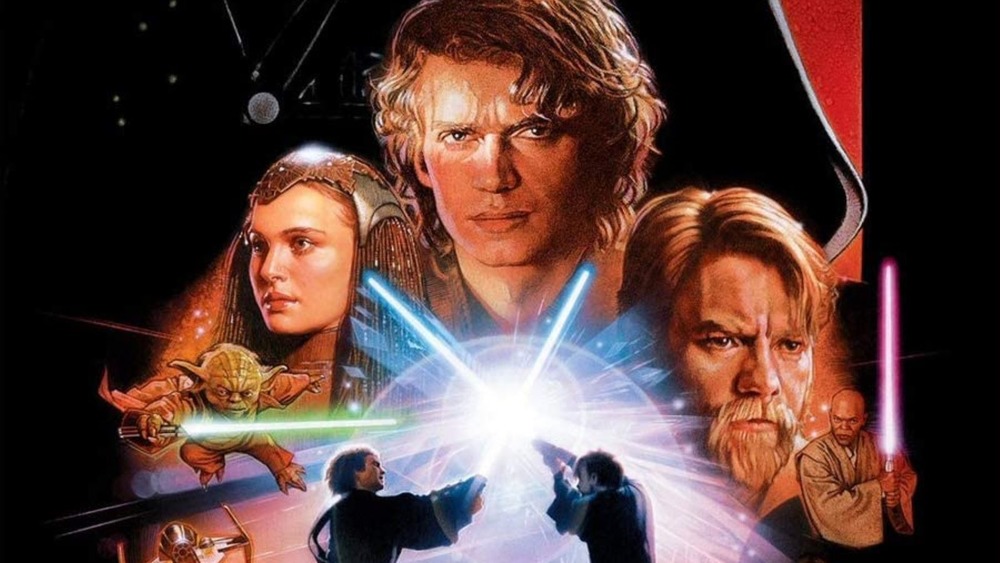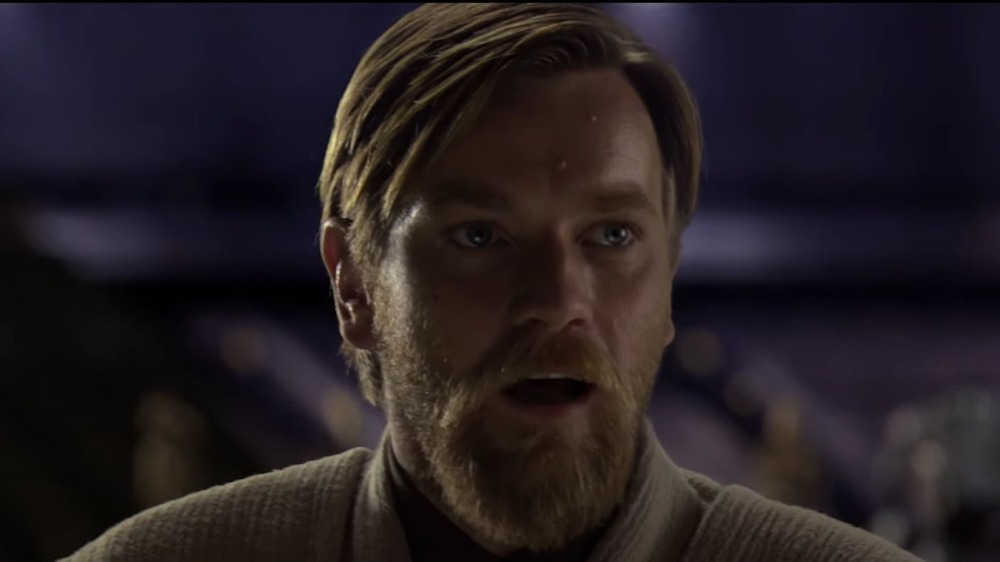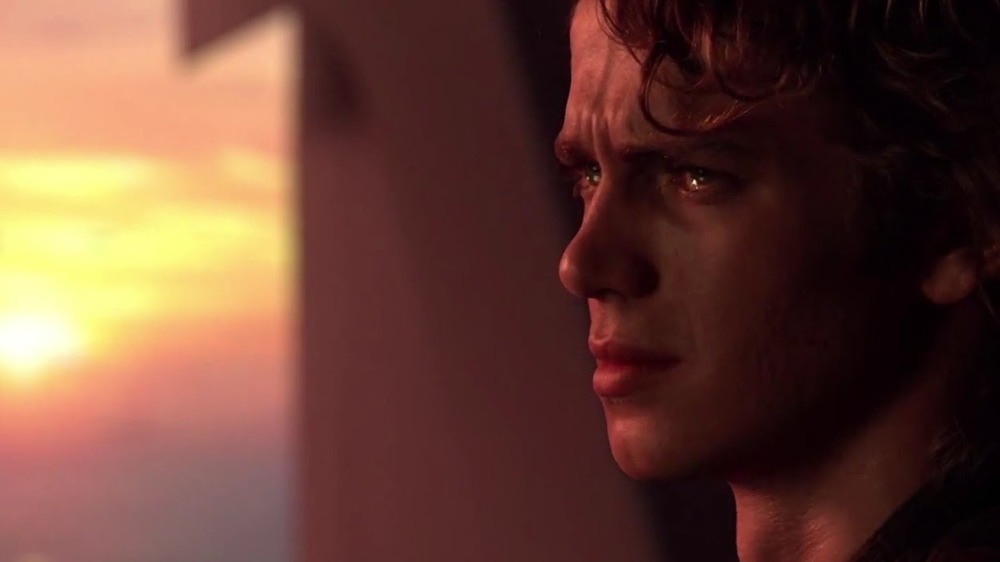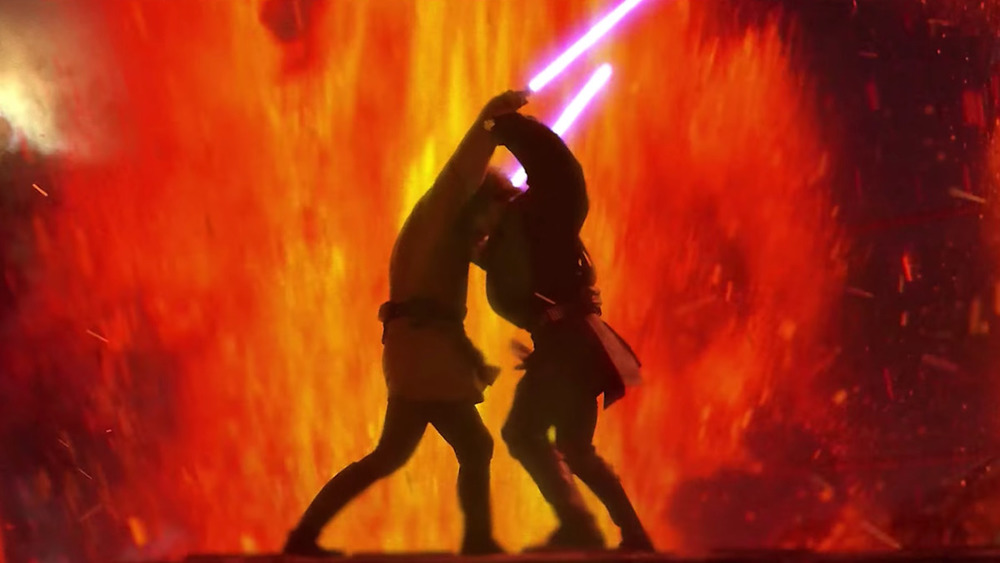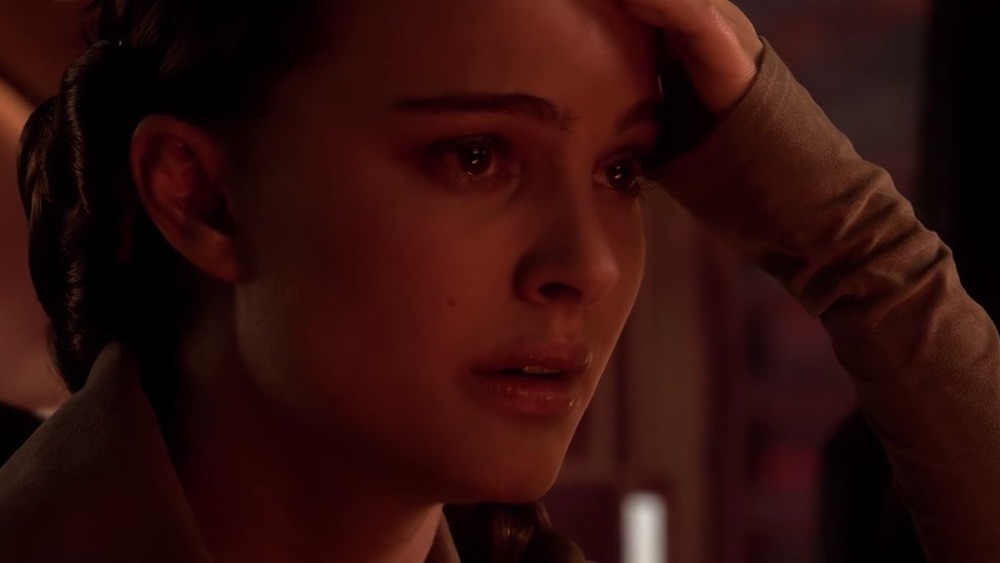Why Star Wars: Episode III - Revenge Of The Sith Is The Best Of The Star Wars Prequel Trilogy
Beginning in 1999 with The Phantom Menace, the George Lucas-directed Star Wars prequel trilogy explores the height of the Galactic Republic and the origin story of Darth Vader, which is finally explained. An interesting concept, to be sure, but a welcome one? That depends on who you ask. All three movies — the other two being Attack of the Clones and Revenge of the Sith — did more than fine at the box office, but their mere mention can set off a wide spectrum of emotions among the fans.
No one's going to say the prequels don't look or sound phenomenal (as is to be expected of Lucasfilm productions), but when it comes to just about every other aspect, fan opinions flare higher and hotter than the lava plumes of Mustafar. Among the most commonly criticized points are Anakin (Hayden Christensen) and Padmé's (Natalie Portman) romantic chemistry (or lack thereof), the use of crude, childish humor, and what is potentially the most controversial plot point in all of Star Wars: explaining the Force via microscopic organisms called Midi-chlorians.
Yet for all that, the prequels have their strengths — things that truly do make them worthy of the Star Wars name. The Phantom Menace's pulse-pounding pod racing scene is always a joy to watch; Anakin confronting the Tusken Raiders in Attack of the Clones after his mother Shmi (Pernilla August) dies in his arms is a haunting bit of foreshadowing; and the final fight between Anakin and Obi-Wan Kenobi (Ewan McGregor) in Revenge of the Sith is ... monumental, to say the least.
Each film definitely has its merits, but Revenge of the Sith is arguably the strongest of the prequels. Here's why.
Fulfilling the quotability quota
Show the above picture to just about anyone in the world, and they'll be able to tell you what Obi-Wan is saying verbatim — and how General Grievous (Matthew Wood) responds. That's the true power of the Force.
In all seriousness, Star Wars has always been an extremely quotable franchise. The dialogue can get pretty cheesy, but that's part of the charm of the galaxy far, far away — part of its enduring Hollywood legacy. The prequels in particular have a wealth of dialogue choices, good and bad, that have gone down as some of the most recognizable in movie history (thanks in no small part to the memes that spawned because of them). Many of these come from Revenge of the Sith.
Some are lighthearted despite the constant danger the characters are in, like what Obi-Wan says as he and Anakin attempt to safely land a desecrated star cruiser plummeting towards the surface of Coruscant: "Not to worry. We are still flying half a ship." Others are a bit more serious, like Padmé's remark about the crumbling state of the Galactic Republic: "So this is how liberty dies. With thunderous applause." Still others are absolute classics for their own specific reasons, the most (in)famous being non-clone Emperor Palpatine's (Ian McDiarmid) declaration that ruined the galaxy: "Execute Order 66."
Because Revenge of the Sith sits on the calamitous precipice that leads to the events of the original trilogy, a lot of quotes from the movie are also insightful or heartbreaking in retrospect. Palpatine's "Have you ever heard the tragedy of Darth Plagueis the Wise?" and the story that follows provide a bit of foreshadowing into how his relationship with Anakin is going to end. And Obi-Wan's simple last words to Anakin before they find their lightsabers locked later on are tear-inducing with viewer foresight: "Goodbye, old friend. May the Force be with you."
Better overall acting
Alec Guinness remains the only Star Wars actor ever to receive an Oscar nomination for acting (for his role as Obi-Wan "Ben" Kenobi in A New Hope), but that doesn't mean there haven't been other solid performances in the franchise. Harrison Ford's turn as Han Solo basically became the template for all sci-fi rogues that followed him (though he entered a long tradition that arguably began with C.L. Moore's Northwest Smith); Ian McDiarmid is pitch perfect as the evil Palpatine in all his appearances; and Daisy Ridley's grounded performance as Rey only got better with time. Nonetheless, Star Wars isn't necessarily known for its acting — the prequels especially. There are definitely some stand-out performances, but twice as many that can drag things down.
Even so, Revenge of the Sith arguably showcases the best performances compared to its two predecessors. McGregor is at the top of his game as Obi-Wan, nailing the balance between his brasher past and his wiser future; Frank Oz plays the downfall of Yoda with emotional aplomb, even after CGI replaced his puppeteering skills; Christopher Lee's presence is as palpable as ever as Count Dooku, even if his time is cut short at the end of two lightsabers; and it must be said that Christensen improved on his characterization of Anakin.
Indeed, after Jake Lloyd's turn as child Anakin in The Phantom Menace – and what's largely considered an underwhelming (and occasionally creepy) performance by Christensen in Attack of the Clones – many Star Wars fans had already thrown in the towel by the time Revenge of the Sith came out. But while his acting doesn't ascend to Shakespearian levels, Christensen does feel a bit evened-out in the film. His physicality as a talented Jedi is more than on point, he delivers a few classic lines well ("This is where the fun begins," anyone?), and you can really feel his pain during the immolation scene on Mustafar. It'll definitely be interesting to see him return for the Kenobi Disney+ series with years of additional acting experience under his belt.
Sabers clash, tears flow
Going into a new Star Wars film, one of the questions on everyone's mind is: "How's the new lightsaber fight going to be?" Each clash is unique for its own reasons, but they're always something to look forward to no matter what else the audience may feel. Case in point: The Phantom Menace's duel of fates, pitting Qui-Gon Jinn (Liam Neeson) and Obi-Wan against the acrobatic and deadly Darth Maul (Ray Park and Peter Serafinowicz). The rest of the movie isn't looked back upon too fondly by many, but that fight? John Williams' score? Obi-Wan nearly losing himself? Perfection. Attack of the Clones' four-way fracas between Anakin, Obi-Wan, and Yoda versus Dooku is also an exciting time; the cinematography and lighting after Anakin cuts the room's power with a swipe of his lightsaber are particularly well done.
Revenge of the Sith has a healthy heaping of lightsaber action too — the most out of all the prequels — and, to be fair, not all of it hits the mark. Palpatine versus members of the Jedi Council led by Mace Windu (Samuel L. Jackson) in particular is lacking that certain something that really makes a lightsaber fight pop – even if its ending is shocking (pun not intended, but hey). The Anakin and Obi-Wan versus Dooku rematch, on the other hand, not to mention Obi-Wan versus the multiple sabers of Grievous, and Yoda versus Palpatine in the Galactic Senate Chamber are all some of the straight-up coolest fights in the franchise.
The real masterpiece of the film, though, is Anakin versus Obi-Wan. Incredible choreography aside, it's dripping with the one thing that makes a fight truly memorable: emotional investment in the characters. Not only have the majority of viewers already watched Anakin and Obi-Wan's relationship build over the course of the prequels, but they know how it ends in A New Hope. That puts weight behind every strike, every parry, every moment of eye contact between the former master and apprentice — the former brothers. It's among the hardest scenes to watch in all of Star Wars for how absolutely gut-wrenching it is. Luke and Leia's birth not long after is the ultimate reminder that even in the face of such crippling despair, there's always hope.
Emotional resonance
In that vein, Revenge of the Sith is the most emotionally resonant of the prequels in general. Part of that has to do with the fact that it acts as the bridge between the prequels and the original trilogy, so it has a certain feeling of finality that its predecessors lack. Unfair advantage or not, the film does tackle some truly heavy stuff. It's not all perfectly executed, but the generally better acting, weightier dialogue, and dramatic reduction in the immature humor department work together to create a palpable, tonal shift from light to dark. If ever the viewers themselves could feel a disturbance in the Force, it's in Revenge of the Sith.
Take the Order 66 scene. It could be argued that it doesn't hit as hard as it could have because the prequels don't do much to characterize any of the Jedi killed by the clones. (For Star Wars: The Clone Wars fans, though, it's a different story.) A fair point, but this is still the fall of the Jedi Order — the very group viewers see at the height of its power in the prequels, the very group mythicized and deconstructed in the original and sequel trilogies. The Jedi were never perfect, but the thing replacing them is far, far worse, and all viewers can do ... is watch. It's Star Wars history in the making, and it's not glorious; it's gruesome. As always, John Williams' score only amplifies the emotions of the sequence.
The same holds for many other Revenge of the Sith scenes: Dooku's shock as Palpatine bids Anakin kill him, younglings backing away in fear as a hooded Anakin ignites his lightsaber, the birth of Darth Vader juxtaposed against the death of Padmé, and more. Of course, even two good scenes in a row can feel disjointed if there's no flow between them, but the film is largely cohesive in that respect. Lucas may be a flawed director, but he knows how to balance one scene with the next — and often in Star Wars' case, how to overlap scenes without causing confusion.
So ... is Revenge of the Sith a perfect movie? Far from it. It does, however, check off plenty Star Wars and filmmaking boxes, making it the best of the prequels trilogy. Whether you agree or disagree, to quote many a Jedi, may the Force be with you.
